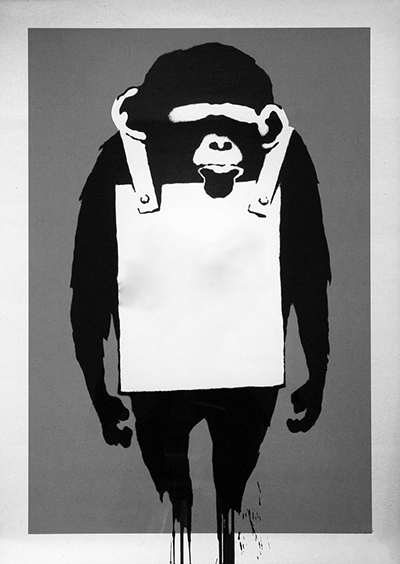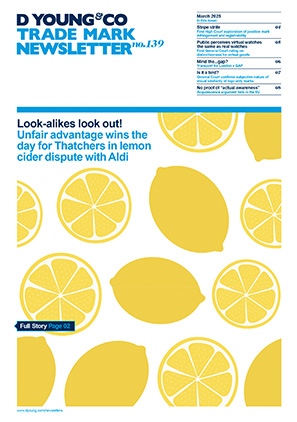Banksy back in charge: Board of Appeal reverses EUTM cancellation
The EUIPO’s Board of Appeal annulled the controversial decision to cancel Banksy’s EUTM for the LAUGH NOW BUT ONE DAY WE’LL BE IN CHARGE mark, on the grounds of bad faith (under Article 59(1)(b) of the EU Trade Mark Regulation 2017/1001).
Background
The EUTM, which covers the mark depicted below, was filed by Banksy’s representatives, Pest Control Office Ltd. In its cancellation application, Full Colour Black Ltd pointed out that the mark had previously been displayed on Banksy’s Gross Domestic Product website which “encourages the copying, borrowing and uncredited use of Banksy’s imagery” for activism, education and personal entertainment purposes. Banksy also famously stated in the past that “copyright is for losers” and has not enforced those rights as that would entail him losing his anonymity.

In the lower instance decision, the EUIPO Cancellation Division ruled that the mark had been applied for in bad faith, as the proprietor’s intention at the time of filing had been to obtain legal rights in the sign other than copyright rights. The EUIPO considered that this was inconsistent with the function of a trade mark.
Subsistence
On review of the earlier decision, the Board of Appeal found that the same artwork or sign may be protected by both copyright and trade mark law. The fact that the mark at issue represented one of Banksy’s artworks which could have been protected by copyright law did not automatically preclude that same mark from functioning as a badge of origin for the goods and services at hand. As a result, it could function as a trade mark.
The cancellation applicant failed to convince the Board of Appeal that the contested sign would be non-distinctive due to its alleged decorative nature. The mere claim that the contested sign was decorative represented a subjective view which “could not be verified”.
The Board of Appeal noted that the representation of an ape wearing an empty label included in the EUTM was not merely ornamental feature which would go unnoticed, but an unusual combination of striking elements which would be kept in mind by the consumers.
Further, it was noted that the subject matter of goods and services does not follow automatically from the fact that a sign contains an artwork, because copyright and trade mark law can protect different aspects of the same work or sign. Thus, a creative work can be protected as a trade mark even if it has entered the public domain under copyright law, for example if it acquires a secondary meaning. The cancellation applicant’s arguments on descriptiveness and non-distinctiveness were therefore rejected.
Bad faith
On bad faith, a holistic consideration of various factors was required. The Board of Appeal took into account:
- The fact that the sign was publicly available as an artwork (graffiti) which could be reproduced by the public;
- the fact that Banksy did not take steps to protect his copyright in relation to non-commercial uses of the work; and
- Banksy’s critical views on copyright.
None of the these factors demonstrated that the proprietor did not have the requisite intention to use the contested mark as a trade mark. Even if Banksy had indeed opted for trade mark protection instead of copyright in order to preserve his anonymity, that was irrelevant for the purposes of trade mark law and “did not exclude an intention to use the trade mark”.
It was also stated that Banksy had the right to express critical opinions on copyright, pursuant to Article 19 of the Universal Declaration of Human Rights which protects freedom of expression. In any event, it would have been difficult for the cancellation applicant to prove that the EUTM proprietor had a negative view on IP rights, and that this negative view of copyright directly led to the filing of the EUTM (with no intention of using the sign as a trade mark).
Finally, it was noted that the cancellation action had been filed in November 2019, less than a year after the EUTM had been registered (March 2019), without regard to the five year grace period. Banksy still has time to commence genuine use of the EUTM before that period expires.
Finding that the cancellation division had erred in its finding of bad faith, the Board of Appeal rejected Full Colour Black’s request for an invalidity declaration in its entirety.
In short
The Board of Appeal’s decision contains a far less generous assessment of bad faith principles than the first instance decision, and could constitute a positive development for brand owners seeking to enforce a broad range of IP rights over the same work.
Case details at a glance
Jurisdiction: European Union
Decision level: Board of Appeal
Parties: Pest Control Office Ltd and Full Colour Black Ltd
Date: 25 October 2022
Citation: R 1246/2021-5

